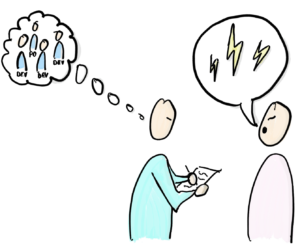In the talk I gave at Agila Sverige in June, I brought up misconceptions about UX I’ve encountered during my years in the IT business. One of these is that it’s only the UX people (and possibly the PO) who need to meet the users. In this post I’ll discuss why this not true, but also how meeting the users can make a real difference in focus and motivation for the team.
It’s not only the UX people that should be involved in user research
“Developers are there to code, right? Everything else is waste.” That is how some old school people in organisations seem to think about it. This, in tandem with the belief stated above, i.e., that only UX people should be involved in user research, does not only cause products and services not to be as good as they could be, but also a lack of motivation to deliver something that someone actually might want to pay for.
As mentioned in my previous posts in this series, you need to know things about the users, their needs and circumstances, to make a good product or service. This applies to everyone who’s involved in making it. Decisions are made all the time that influence the user’s future experience of the product or service. If these decisions are made without enough knowledge to evaluate the consequences of them on the user experience, there is a huge risk that really poor choices are made in terms of user experience. (I was just the other day in a conversation with some back-end developers that was on the verge of implementing an architectural change in an application that not at all would solve the problem the feature they were a part of developing was designed for. The discussion we had quickly uncovered that there was completely different mental models of the problem within the group, and this was mainly because the developers lack of knowledge about the users and the real use cases of what they were building.)
In a team where the UX professional is the only one with knowledge about the users, everyone else has to consult him or her all the time about minor things like how to implement details of a user story. This makes the UX professional a bottleneck for the team which eventually can slow it down considerably. By spending some just some time on learning about the users and their characteristics, time will be saved later.
Apart from developing knowledge about users, something else also happens almost automatically when meeting with real users – you start to care about them. Once you start to care about the users, you start to care about the product. It becomes personal because you want to deliver something good to the persons you have met or seen. This leads to more motivated teams which strives towards a common goal – making a great product or service for the users.
Another reason why you get more motivated to make great products from meeting the users is that you quite often get positive feedback on things you’ve already made. When you are working with product or service development, it’s easy to only focus on bugs and flaws, but when people who have been using the product or service for a while talk about it, they often bring up things they really like about it. Hearing positive things about something you have been part of making is almost addictive – you want more. And the only way to get more is to continue making great stuff.
If you are a developer or in any other way new to UX and want to learn more about how to go about meeting the users, keep your eyes out for the next time me and Martin will hold our course Modern UX. If you want to read the previous two parts of this series, please go to UX – It’s obvious, right?: Part 1 and UX – It’s obvious, right?: Part 2 in which I discuss that UX is not the same as UI, and even though you might be a UX expert, you still have to meet the users.
Disclaimer: I am no longer at Crisp so therefore the comment section for this post has been closed. However, if you want to come in contact with me regarding any of the content, please email me at anneli.olsen [at] tinypaws.se.




